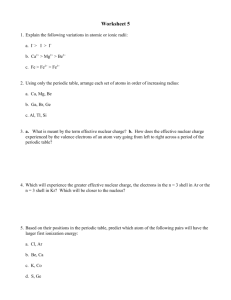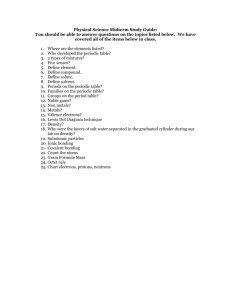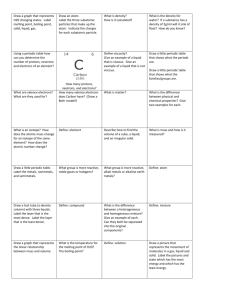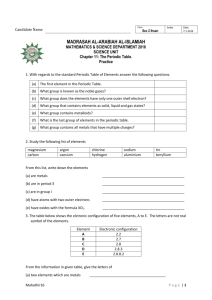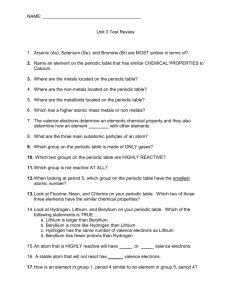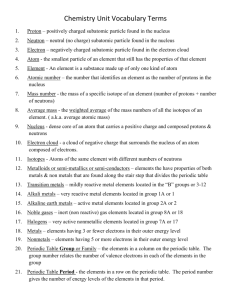ptoe
advertisement
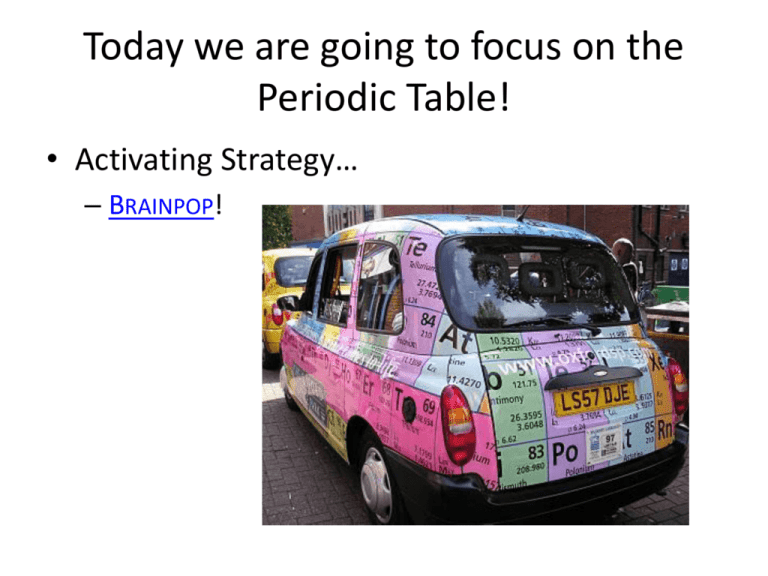
Today we are going to focus on the Periodic Table! • Activating Strategy… – BRAINPOP! A Beautiful Mind This crazy looking man is Russian chemist DMITRI MENDELEEV. Mendeleev created the first Periodic Table in 1869. So why is the PToE important? •ORGANIZATION. – There are a lot of elements on earth. If we don’t know anything about them/what they have in common, we can’t understand them. THINK, PAIR, SHARE: (2 minutes) Think back to the end of Earth’s History. We learned about another system of organization that scientists use. What was that system and what did it do? HINT: Think evolution! So how is the Periodic Table organized? • Vertical Columns = groups • Horizontal Rows = periods Your periodic table already has the groups (those gray boxes I told you not to color), let’s label the periods. Each element lives with its own Family • Elements on the periodic table can be grouped into families based on their chemical properties. • Each family has a specific name to differentiate it from the other families in the periodic table. • Elements in each family react differently with other elements. 1 Week til THXGIVING! 11/15/2012 DO NOW! 1. Find the element and identify its family: - Group 6, Period 5 Group 5, Period 4 Group 17, Period 2 Noble gas with atomic symbol “Ne” Transition metal with atomic symbol “Ag” PLEASE DO NOT TOUCH ANYTHING ON YOUR LAB TABLES! Let’s mix it up… • 4 stations – 20 minutes at each station. • Each station has notes, directions, an activity, and clean up instructions. • Please be responsible with the materials. • Expectations: – Work together – Low volume – Complete the activity – Stay in your assigned group Gallery Walkers • Because Ms. K will be working with 1 group of students while you are doing your gallery walk, it is IMPERATIVE that you follow these rules & directions. • You will have exactly 1 song per station. • Do NOT move until the music changes. • Do NOT move before the music changes. YOU MUST BE ON TASK, QUIET, AND AT YOUR ASSIGNED STATIONS AT ALL TIMES OR MS. K WILL ASK YOU TO SIT DOWN. -Organize on your plate a HELIUM (He) atom! -Draw what your plate looks like 2 H Helium 4.00260 • Now change your Helium atom into an ION with a charge of -1 on your plate! • Draw it! 2 H Helium 4.00260 • Draw a Beryllium (Be) atom! 4 Be Beryllium 9.01218 • Make your Beryllium atom into an Ion with a charge of +2 4 Be Beryllium 9.01218 • Draw a Lithium atom. 3 Li Lithium 6.941 • Make the Lithium atom into an Ion with a charge of -3. 3 Li Lithium 6.941 ALKALI METALS Group 1 • Hydrogen is not a member, it is a non-metal • 1 electron in the outer shell • Soft and silvery metals • Very reactive, esp. with water • Conduct electricity Image: http://www.learner.org/interactives/periodic/groups2.html ALKALINE EARTH METALS Group 2 • 2 electrons in the outer shell • White colored and malleable • Reactive, but less than Alkali metals • Conduct electricity TRANSITION METALS Groups in the middle • Good conductors of heat and electricity. • Some are used for jewelry. • The transition metals are able to put up to 32 electrons in their second to last shell. • Can bond with many elements in a variety of shapes. Halogens Group 17 • 7 electrons in the outer shell • All are nonmetals • Very reactive are often bonded with elements from Group 1 Noble Gases Group 18 Exist as gases Non-metals 8 electrons in the outer shell = Full Helium (He) has only 2 electrons in the outer shell = Full Not reactive with other elements Let’s Practice! • You and your partner are responsible for: – Using your new colored periodic table as a reference. – Answering ALL investigation questions. – Raising your hands when you have questions. – COLLABORATING SUCCESSFULLY to complete work during the given time – Value- 50 point in class assignment. Use your knowledge & periodic table to help you identify the following elements. Also include what FAMILY they belong to (complete in your notebook): 1. 3. 4. 2. Exit Ticket – COMPLETE sentences, separate sheet • HOT Q1: Why is it important to have a system of organization for all of the elements on earth? • HOT Q2: Why do only electrically stable elements live on the Periodic Table? • HOT Q3: What are the 2 most reactive groups? Why are they so reactive? HOT Q4: Why don’t the noble gases react?
